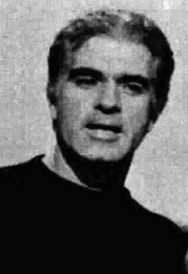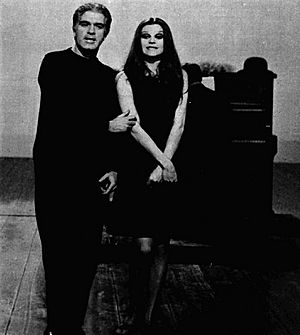Giorgio Strehler facts for kids
Quick facts for kids
Giorgio Strehler
|
|
|---|---|

Strehler in 1968
|
|
| Member of the Senate | |
| In office 2 July 1987 – 22 April 1992 |
|
| Constituency | Lombardy |
| Member of the European Parliament | |
| In office 26 September 1983 – 23 July 1984 |
|
| Constituency | North-West Italy |
| Personal details | |
| Born | 14 August 1921 Trieste, Kingdom of Italy |
| Died | 25 December 1997 (aged 76) Lugano, Switzerland |
| Political party | Socialist (1979-1984) Independent Left (1987-1992) |
| Alma mater | Accademia dei Filodrammatici University of Pavia |
| Occupation | actor opera theatre director |
Giorgio Strehler (born August 14, 1921 – died December 25, 1997) was a famous Italian actor and director for both opera and theatre. He is known for helping to shape modern theater in Italy and for his amazing productions that were seen all over the world.
Contents
Giorgio Strehler's Early Life and Career
Giorgio Strehler was born in Barcola, a town near Trieste, Italy. His father passed away when Giorgio was only three years old. His grandfather, Olimpio Lovrich, then became a very important person in his life.
Olimpio was a talented horn player and managed the Teatro Comunale Giuseppe Verdi, which is Trieste's Opera House. When Giorgio was seven, his grandfather also died. After this, Giorgio moved to Milan with his mother and grandmother.
Discovering a Love for Theater
As a child, Giorgio wasn't very interested in theater. He thought it seemed "fake" and believed that movies were much better at making people feel emotions.
However, one hot summer night, everything changed. He was on his way to the cinema when he saw a sign for air-conditioning at the Odeon Theater. He went inside to cool off and ended up watching a play by Carlo Goldoni called Una delle ultime sere di Carnevale.
This play was performed by a group from Venice. Giorgio was so impressed that he went back every evening for several days to see more of Goldoni's plays. This experience completely changed his mind about theater. He then applied and was accepted into the Accademia dei Filodrammatici, a special theater school.
Starting the Piccolo Teatro
During World War II, Giorgio Strehler had to leave Italy and live in Switzerland for a while. There, he directed the first-ever performance of Albert Camus's play Caligula with a group called the Compagnie des Masques.
After the war, he worked as a theater critic, writing about plays for a newspaper. But he soon realized he preferred making theater rather than just writing about it. So, he teamed up with Paolo Grassi to start the Piccolo Teatro di Milano.
The Piccolo Teatro opened on May 17, 1947. Their first play was The Lower Depths by Maxim Gorky. A few days later, they put on a forgotten play by Carlo Goldoni called Arlecchino: Servant of Two Masters. This play became incredibly popular and is still the longest-running play in Italian theater history. In the same year, Strehler also directed his first opera, La traviata by Giuseppe Verdi, at the famous La Scala opera house.
Giorgio Strehler believed that theater should be meaningful and important to people's lives. He didn't want it to be just a simple show or something to watch without thinking. He and Paolo Grassi agreed that theater should be "a place where people gather to hear statements that they can accept or reject."
Strehler's Major Influences and Impact
In the 1950s, Giorgio Strehler directed several plays by Bertolt Brecht, a famous German playwright. Strehler and Brecht became good friends and shared similar ideas about politics and theater.
In 1956, Brecht even came to see Strehler's production of his play The Threepenny Opera. Brecht was very impressed and wrote a letter thanking Strehler for the "excellent performance." He praised the show for its "fire and freshness, ease and precision."
Favorite Playwrights
Strehler had a deep love for the works of William Shakespeare, including plays like Coriolanus, The Tempest, and King Lear. He also loved Luigi Pirandello (Enrico IV) and Anton Chekhov (The Cherry Orchard).
However, he always returned to the plays of Carlo Goldoni, often directing the same plays years apart.
Defining the Role of a Director
Giorgio Strehler played a huge part in creating the role of the theater director in Italy. Before him, plays were mostly put on by traveling groups of actors who directed themselves. They didn't even know what a "director" was!
Strehler also made sure to highlight Italian writers, even though there weren't many famous Italian playwrights. He used to say that Italy had produced few important playwrights like Niccolò Machiavelli, Carlo Goldoni, and Luigi Pirandello. But, Italy had produced a huge number of actors. He noted that between the 1500s and 1700s, every important court in Europe wanted to have a group of Italian actors.
Global Recognition and Legacy
Giorgio Strehler influenced many actors and directors across three generations. His impact was felt less in English-speaking countries because he didn't speak much English and didn't direct many plays in that language.
However, he received many honors from other countries. The French government gave him the Légion d'honneur, which is a very high award. In 1985, he was named director of the "Union of the Theatres of Europe" in Paris. This was the first theater project that included many different European countries.
In 1982, he was the head of the jury at the Cannes Film Festival, a major international film event. In 1990, he received the Europe Theatre Prize.
Strehler always cared a lot about how his productions looked on stage. He worked closely with stage designers Luciano Damiani and later Ezio Frigerio for many years. They helped him create the visual magic for both his theater and opera shows.
Giorgio Strehler passed away in Lugano, Switzerland. His funeral in Milan was attended by many citizens and politicians. His ashes were buried in the cemetery of Trieste.
Notable Opera Productions
Here are some of the operas Giorgio Strehler directed:
- Jeanne d'Arc au Bûcher by Arthur Honegger at La Scala, Milan (1946)
- Lulu by Alban Berg in Venice (1949)
- The Fiery Angel by Sergei Prokofiev in Venice (1955)
- L'histoire du soldat by Igor Stravinsky at Piccola Scala, Milan (1957)
- Die Entführung aus dem Serail by Mozart at Salzburg Festival (1965)
- Simon Boccanegra by Verdi at La Scala, Milan (1971)
- The Magic Flute by Mozart at Salzburg Festival (1974)
- Don Giovanni by Mozart at La Scala, Milan (1987)
- Così fan tutte by Mozart at Piccolo Teatro, Milan (1998) (He passed away during the final rehearsals for this one.)
Important Theatre Productions
Here are some of the plays Giorgio Strehler directed:
- Richard II by Shakespeare (1948)
- Julius Caesar by Shakespeare (1953)
- Coriolanus by Shakespeare (1957)
- Re Lear by Shakespeare (1972)
- The Tempest (play) by Shakespeare (1978)
- Harlequin (a very old and famous Italian show, directed many times starting from 1947)
- Servant of Two Masters by Goldoni (1964)
- The Cherry Orchard by Chekhov (1955, 1974)
- The Mountain Giants by Pirandello (1947, 1966, 1994)
- The House of Bernarda Alba by García Lorca (1955)
- The Visit of the Old Lady by Dürrenmatt (1960)
- Three Penny Opera by Bertold Brecht (1956)
- The Good Person of Setzuan by Bertolt Brecht (1958, 1981 and 1996)
- Galileo Galilei by Bertolt Brecht (1963)
On October 10, 2005, a street in front of the Politeama Rossetti theater in Trieste was named after Giorgio Strehler to honor him.
Europe Theatre Prize
In 1990, Giorgio Strehler was given the third Europe Theatre Prize. The people who chose him said that his work was a very important part of European theater after World War II. They noted that he wasn't just a director, but also a manager, a guide, an actor, a writer, a teacher, and someone who strongly believed in theater's role in society. His efforts led to the creation of the first truly European theater group, the Théâtre de l’Europe, which he was asked to lead.
Honors
- Honorary degree, University of Pavia, 1992.
See also
 In Spanish: Giorgio Strehler para niños
In Spanish: Giorgio Strehler para niños


